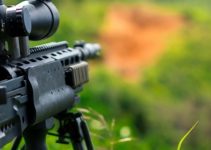Gun Laws in Louisiana
Contents
Louisiana does not require that individuals first obtain a permit before purchasing a handgun, shotgun, or a rifle. However it is illegal in the state of Louisiana to sell dangerous items or firearms to those under the age of eighteen. Law states that not knowing the individual’s age is not a sufficient defense. Rifles, handguns, and shotguns do not need to be registered either.
 Louisiana citizens may possess a handgun, shotgun, or rifle without a permit as stated by law. Transferring or selling a firearm to an illegal alien is unlawful as is providing a firearm to a citizen of another country with which the United States has conflicts. Those who have been convicted of certain crimes also may not possess a firearm until ten years have passed since the completion of parole, probation, sentence suspension, or the sentence.
Louisiana citizens may possess a handgun, shotgun, or rifle without a permit as stated by law. Transferring or selling a firearm to an illegal alien is unlawful as is providing a firearm to a citizen of another country with which the United States has conflicts. Those who have been convicted of certain crimes also may not possess a firearm until ten years have passed since the completion of parole, probation, sentence suspension, or the sentence.
Minors under the age of seventeen are unlawful to possess a firearm unless accompanied by guardian or parent. These circumstances stipulate that this can only happen during firearm safety courses, target practice in an enclosed facility, legal hunting with an adult, or while traveling to secured activities with an unloaded and secured firearm.
Louisiana is bordered by Arkansas on the north and the Gulf of Mexico to the south. Mississippi borders Louisiana on the east, and Texas is its western border. Louisiana has a population of about 4,600,000 people.
Carrying Firearms in Louisiana
Rifles, handguns, and shotguns do not need to be registered but permits must be obtained to carry a concealed handgun. Permits are not necessary for carrying shotguns or rifles. Only on-duty peace officers are eligible to carry handguns without permits.
Only certain individuals are eligible to apply for a concealed weapons permits. These include those who show adequate training in the use of a firearm; those who are above the age of twenty-one; Louisiana state citizens for at lease six months or more; those who have not be committed for mental illnesses; those who have not been convicted for a felony offense; those who have not abused controlled substances; those who have not plead guilty to using a controlled substance within a five year period; those who are not regular alcohol abusers; those who have not plead guilty to a misdemeanor within five years; those who are not addicted to stimulants, depressants, narcotics, or marijuana; those who are not justice fugitives; legal citizens; those who have been honorably discharged from the United States military; those who have not engaged in violent crimes or behavior; and those who, under federal law, are eligible to posses a firearm.
Carrying Firearms in Vehicles
Louisiana permits anyone who is legally allowed to possess a firearm to transport or store such firearm in a locked, privately-owned motor vehicle in any parking lot, parking garage, or other designated parking area.
Carry in Restaurants That Serve Alcohol
Louisiana law generally prohibits a person from intentionally carrying a firearm, openly or concealed, while on the premises of an alcoholic beverage outlet, which includes any commercial establishment in which alcoholic beverages are sold in individual servings for consumption on the premises, whether or not such sales are a primary or incidental purpose of the business of the establishment. However, this prohibition does not apply to the owner, lessee, or employee of such an outlet, to law enforcement officers, or to a person possessing a firearm in accordance with a concealed handgun permit on the premises of an alcoholic beverage outlet which has been issued a Class A-Restaurant permit.
Self-defense Laws
Louisiana has both Castle Doctrine and SYG laws. There is no duty to retreat from any place You have a legal right to be. You may use force, including deadly force, in defense of yourself or others if You reasonably believe it is necessary to prevent imminent death, SBI, the commission of a forcible felony, or to stop the unlawful & forcible entry into Your dwelling, place of business, or occupied motor vehicle. Deadly force may also be used if reasonably necessary to stop an intruder from using unlawful force against an occupant of a dwelling, business, or occupied motor vehicle in the course of a robbery.
Open Carry
Open carry is legal in Louisiana without a permit. Places listed in the “Criminal Provisions” above apply to those who open carry. The state preempts all firearm laws in the state and local authorities cannot have laws/ordinances prohibiting open carry unless such law of a local government was in place before July 15, 1985.
Obtaining a Permit
To acquire a concealed weapons permit, individuals must first pass and complete the proper courses, programs, and classes associated with training and safety. The Deputy Secretary of Public Safety will handle the applications and pass them to the proper authorities within two days. Once validated a concealed weapons permit stands for four years before renewal is necessary.
When questioned by a police officer, the individual is required to produce the permit and must allow the officer to obtain the weapon temporarily and must submit to being pat down for safety reasons. If an officer finds an individual under the impairment of alcohol or a controlled substance, the officer may take the weapon and request a chemical test.
Reciprocal Carry
By statute, Louisiana will recognize another state’s license to carry if that state recognizes Louisiana’s license:
“A current and valid concealed handgun permit issued by another state to an individual having attained the age of twenty-one years shall be deemed to be valid for the out-of-state permit holder to carry a concealed weapon within this state if a current and valid concealed handgun permit issued by Louisiana is valid in those states.”
Anyone contemplating reciprocal carry should check with the official list maintained by the Louisiana State Police at the point in time the reciprocal carry is to occur.
Criminal Provisions
Under Louisiana law, a license to carry a handgun is not valid in any of the following places or circumstances:
- On school property, a school sponsored event, or in a firearm-free zone (including within 1,000 feet of school property, any school campus, or school bus)
- While on the premises of an alcoholic beverage outlet, or any portion of an establishment selling alcoholic beverages for consumption on the premises, unless You are the owner or an employee. (There remains a conflicting statute in place that permits carry into a place that serves alcohol if it has a Class A-Restaurant permit)
- While under the influence of alcohol or a controlled dangerous substance (under the influence of alcohol is considered a blood alcohol level of .05)
- Any place banned by federal law
- A law enforcement office, station or building
- A detention facility, prison or jail
- A courthouse or courtroom
- Any polling place
- Any meeting place of a governing authority
- The state capitol building
- Any areas within an airport which carrying is prohibited by federal law (unless in a carrying case and properly prepared to be checked as luggage)
- A place of worship (church, synagogue, mosque, etc.)
- A parade or demonstration
- Any portion of an establishment selling alcoholic beverages for consumption on the premises


